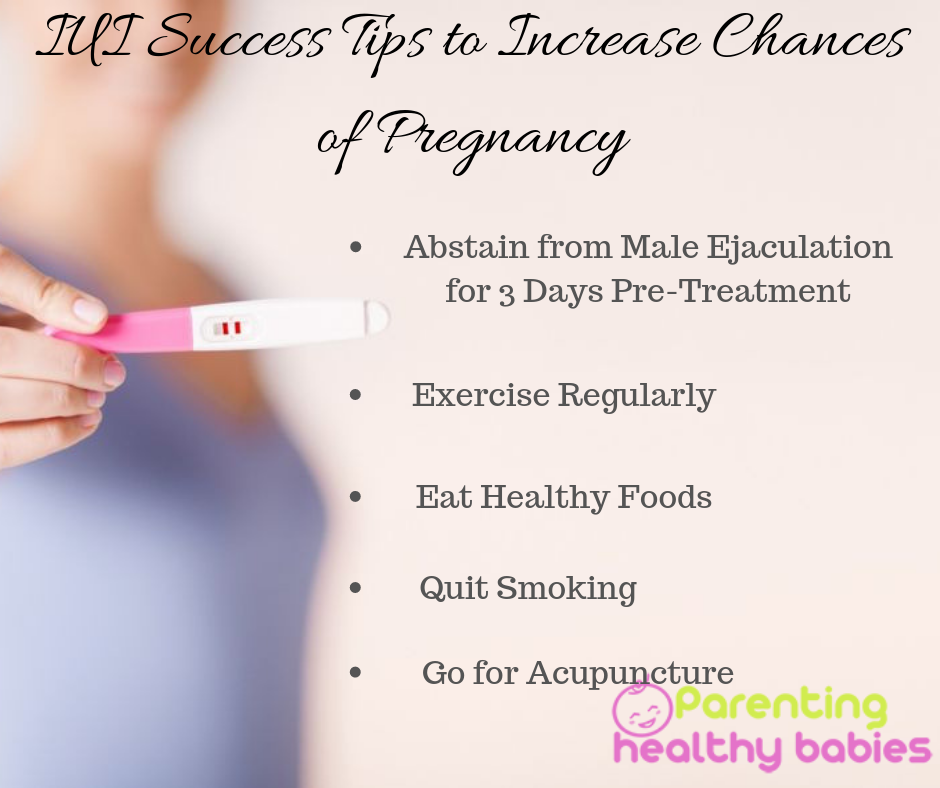Are you and your partner failing to conceive naturally? IUI (Intrauterine Insemination) can be your ideal solution. Here are some IUI success tips and suggestions to improve your chances of getting pregnant with IUI.
In this article:
How does IUI Work?
Who can opt for IUI?
Who Shouldn’t opt for IUI?
11 Tips and Suggestions to Make IUI Successful
What are the Risks of IUI?
How does IUI Work?
Intrauterine Insemination (IUI) is a treatment to enable fertilization by placing sperm inside the uterus. It’s objective is to maximize the count of sperms reaching the fallopian tubes for increasing the chances of fertilization.
Before the treatment, the doctor may administer ovulation-stimulating drugs to determine the maturing time of your eggs. A gush in your LH hormone indicates the occurrence of ovulation soon. Typically 24-36 hours later, around the time of your ovulation, the treatment is done. In the lab, a semen sample is washed and the semen is separated from the seminal fluid. The doctor then uses a catheter to place the sperm directly in your uterus. The next step is to look for signs of pregnancy.
The process involves the least discomfort and lasts for a few minutes.
Who can opt for IUI?
The following people can opt for IUI:
- Women having abnormalities in their patent fallopian tubes and cervical muscles
- Men experiencing ejaculation dysfunction
- Lesbian couples
IUI, however, may or may not work based on one’s biological condition. So, ask an expert whether IUI is your ideal solution to conceive. Doctors recommend 3 IUI attempts at most.
Who Shouldn’t opt for IUI?
The following people cannot opt for IUI:
- Women having a severe disorder of the fallopian tubes
- Women experiencing moderate to severe endometriosis
- Women with a medical history of pelvic infections
11 Tips and Suggestions to Make IUI Successful
Did you know that IUI has 10%-30% success rates? If you opt for IUI, check out below the 11 helpful tips for making IUI successful:
Abstain from Male Ejaculation for 3 Days Pre-Treatment
Men must refrain from ejaculation for at least 3 days before IUI. This increases the amount of semen which further helps to provide a good sperm count for the treatment. However, don’t refrain for more than 5 days since that can negatively affect your chances of getting pregnant.
Research Before Treatment
If you’ve opted for IUI due to infertility problems, then you should know that there are more pocket-friendly options like IVF (In Vitro Fertilisation). For instance, doctors suggest IVF more than IUI to women older than 40 years as IVF success rates are generally higher for older women.
Visit an Expert
First of all, make sure that you’re a suitable candidate for IUI. Your doctor may recommend other methods of conception. Ensure that the reproductive endocrinologist governing your IUI treatment can even cancel cycles on the production of excess eggs. Also, monitoring must be done closely. So, be sure to seek the right person for the treatment.
Exercise Regularly
After your treatment, avoid sitting still for long and keep moving. Moderate exercise is beneficial too. But intense workouts are strictly not advisable by experts.
Eat Healthy Foods
A healthy diet can improve IUI success rate and help pregnancy. Have more protein-rich foods and reduce your carbs intake. Besides, if you’re suffering from PCOS (Polycystic Ovary Syndrome), adopting a healthier diet can raise your chances of conception.
Quit Smoking
Research says that women who smoke require higher doses of gonadotropin for ovarian stimulation. It adversely impacts their IUI success rate. So, stop smoking altogether.
Stay Happy
Do things which give you happiness and satisfaction. According to the Law of Attraction, one attracts what he/she imagines. Positive emotions like the happiness of conceiving can increase IUI success.
Control Anxiety and Avoid Stress
Don’t stress yourself regarding IUI success. You may experience an emotional upheaval while undergoing the treatment. But, calm down, control your anxiety and have realistic expectations. Thus, your body will react positively to the treatment.
Have Prescribed Supplements
Helpful supplements like DHEA and Co Q10 (Coenzyme Q10) are prescribed by the doctor. You can also look for supplements that may help your case depending on your diagnosis.
Go for Acupuncture
Acupuncture can increase IUI success by promoting your blood flow and thereby improving the egg quality. It’s advised to begin acupuncture at least 3 months before IUI.
Have Sex After Treatment
According to doctors, having sex after IUI treatment helps a lot. Wondering how? That’s because your uterus starts contracting during sex, pushing the sperm towards your fallopian tubes and eventually the egg.
Note: If you’re comfortable with any other language (besides English), suppose Telugu, you can check out the IUI success tips in Telugu and likewise from the relevant sources.
What are the Risks of IUI?
Here are some possible complications and risks of IUI:
Multiple Pregnancies
A complication of the fertility drugs taken during IUI can make you pregnant with multiples. However, the risks of conceiving multiple babies or twins after the procedure are quite rare. Multiple pregnancies can raise IUI risks to your baby. These include premature delivery, miscarriage, gestational diabetes, preeclampsia (high blood pressure), low birth weight and complications at birth.
Getting an Infection
During IUI, a thin tube containing sperm is inserted in your uterine cavity through your cervix. This is associated with a little risk of infection. Experiencing pain or cramping while insertion is natural. A higher risk occurs if your cervix gets injured and leads to spotting, bleeding or severe pain after the treatment. So, the doctor will ask you to rest for some time after the process to reduce such risks.
Ovarian Hyperstimulation Syndrome (OHSS)
The risk of getting Ovarian Hyperstimulation Syndrome is associated with the fertility drugs used in IUI like Letrozole and Clomid to stimulate ovulation. So, your ovaries produce more than 20 follicles in one round. This may spike up your estrogen levels, causing inflammation of your ovaries. Enlarged ovaries may result in intense abdominal pain, bloating, breathing problems, and vomiting or nausea.
Conclusion
IUI comes with fewer risks and more success. You only need to follow the above IUI success tips to increase your pregnancy possibilities.
Reference Links













